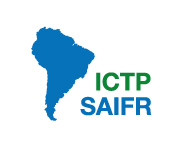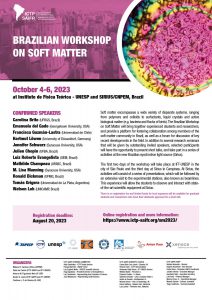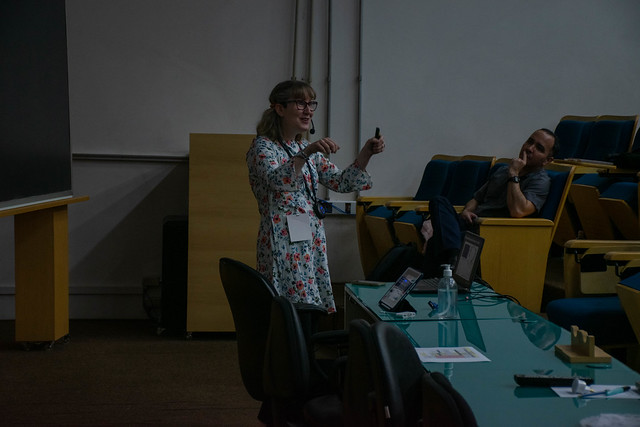SAIFR/SIRIUS Brazilian Workshop on Soft Matter
October 4-6, 2023
São Paulo, Brazil
ICTP-SAIFR/IFT-UNESP & SIRIUS/CNPEM


![]()
Home
Soft matter encompasses a wide variety of disparate systems, ranging from polymers and colloids to surfactants, liquid crystals and active biological matter (e.g. bacteria and flocks of birds). The Brazilian Workshop on Soft Matter will bring together experienced students and researchers, and provide a platform for fostering collaboration among members of the soft matter community in Brazil, as well as a forum for discussion of key recent developments in the field. In addition to several research seminars that will be given by outstanding invited speakers, selected participants will have the opportunity to present short talks, and take part in a series of activities at the new Brazilian synchrotron light source (Sirius).
The first two days of the workshop will take place at IFT-UNESP in the city of São Paulo and the third day at Sirius in the nearby city of Campinas. At Sirius, the activities will consist of a series of presentations, which will be followed by an extensive visit to the experimental stations, also known as beamlines. This experience will allow the students to observe and interact with state-of-the-art scientific equipment at Sirius.
There is no registration fee and limited funds for local expenses will be available for graduate students and researchers who have their abstracts approved for a short talk. Transportation between São Paulo and Campinas will be provided.
Organizers:
- Mateus B. Cardoso (Sirius-CNPEM)
- Pablo de Castro (ICTP-SAIFR and IFT-UNESP)
- Antonio M. Figueiredo Neto (IF-USP)
- Danilo B. Liarte (ICTP-SAIFR and IFT-UNESP)
- Cristiano L. P. de Oliveira (IF-USP)
List of participants: Updated on October 09, 2023
Satisfaction Survey: HERE
Speakers
- Carolina Brito (UFRGS, Brazil)
- Emanuela del Gado (Georgetown University, USA)
- Francisca Guzmán-Lastra (Universidad de Chile)
- Hartmut Löwen (University of Düsseldorf, Germany)
- Jennifer Schwarz (Syracuse University, USA)
- Julien Chopin (UFBA, Brazil)
- Luiz Roberto Evangelista (UEM, Brazil)
- Mathilde Champeau (UFABC, Brazil)
- M. Lisa Manning (Syracuse University, USA)
- Ronald Dickman (UFMG, Brazil)
- Tomás Grigera (Universidad de La Plata, Argentina)
- Watson Loh (UNICAMP, Brazil)
Format: 25 min talk + 5 minutes Questions
Registration
Program
Contributed Talks
Contributed I
1. Francisco Rocha (Aix-Marseille University, France): Rheology of cohesion-controlled granular materials
2. Leandro Rizzi (Universidade Federal de Viçosa (UFV), Brazil): On the origin of the negative energy-related contribution to the elastic modulus of rubber-like gels
3. William de Castilho (USP, Brazil): A renormalization group study of a simple cholesteric model
4. Renan Augusto Lisboa Almeida (IF-UFRGS, Brazil): Percolation in the ordering kinetics of twisted nematic phases
5. Dora Izzo (Instituto de Física – Universidade Federal do Rio de Janeiro, Brazil): Solutions of rods and spheres: predictions for the diffusion coefficient
Contributed II
1. Gustavo During (Pontificia Universidad Católica de Chile, Chile): Collective motion in active solids
2. Felipe Barros (University of Concepción, Chile): Bacterial cargo in a drop: Hollow Micro-Shells
3. Saulo Diles (Faculdade de Física, Campus Salinópolis da Universidade Federal do Pará, Brazil): Spontaneous clustering of persistent self-propelled particles in narrow channels: Motility diversity effects
4. Pablo Muñoz (Universidad Técnica Federico Santa María, Brazil): Macroscale modeling of diel vertical migration in the presence of light gradients using SPDEs
Contributed III
1. Thais Enoki (Institute of Physics – University of Sao Paulo, Brazil): Investigating inter-leaflet coupling of asymmetric lipid bilayers
2. MARCIO SAMPAIO GOMES FILHO (ICTP-SAIFR / IFT-UNESP, Brazil): Modeling the diffusion-erosion crossover dynamics in drug release
3. Leila Separdar (UFSCAR, Brazil): Diffusion-controlled crystal growth kinetics in undercooled BaS semiconductor
4. Ana Novaes Dias (UFMG, Brazil): Mean Field Theory for a Vicsek-like Model on a Lattice
5. Igor Morais Telles (Universidade Federal do Rio Grande do Sul, Brazil): Effects of electrostatic coupling and surface polarization on polyelectrolyte brush structure
6. Vera B. Henriques (IFUSP, Brazil): Lattice Boltzmann calculations for fluid flow through porous or charged spheres and shells
Contributed IV
1. CARLOS EDUARDO FIORE DOS SANTOS (USP, Brazil): Powerful ordered collective engines
2. Matheus Valença Correia (Universidade Federal de Pernambuco (UFPE), Brazil): Structural phases of classical 2D clusters with competing two-body and three-body interactions
3. Lucas Nicolao (Departamento de Física, Universidade Federal de Santa Catarina, Brazil): Melting of the 2D solid phase of the Gaussian-core model explained
4. Adolfo Javier Banchio (Universidad Nacional de Córdoba and CONICET, Argentina): Structure and isomorphism in dipolar density interacting disks: simulations and integral-equation theories
5. Daniel Acuña (Departamento de Física, Facultad de Ciencias Físicas y Matemáticas, Universidad de Chile, Chile): Auxetic Granular Metamaterials
Format: 10 min talk + 5 minutes Questions
Updated: October 4, 2023
Sponsors' presentations
Poster Presentations
- Leonardo Santos Lopes (Universidade Federal de Minas Gerais, Brazil): Vicsek model with Malthusian Dynamics
- Italo Salas (Universidad de Chile, Chile): Understanding motility induced phase separation and Contagion Dynamics of active brownian particles using complex networks
- CRISTIAN ANDRÉS VILLALOBOS (Universidad de Chile, Chile): Flow fluctuation in confined bacterial suspensions
- Emanuel Fortes Teixeira (Instituto de Física da Universidade Federal do Rio Grande do Sul (UFRGS), Brazil): Investigating the Hypothesis of Differential Surface Contraction through Active Rings for Cellular Tissue Segregation
- Edmundo Ignacio Vazquez Aguilar (Instituto de Física, Universidad Nacional Autónoma de México, México): Intermediate scattering function of Active Particles in Viscoelastic Fluids using Differential Dynamic Microscopy
- LUCAS GABRIEL BEZERRA DE SOUZA (Federal University of Rio Grande do Norte, Brazil): Two-Stage Pattern Formation in Dense Active Mixtures
- Bernardo Boatini (Instituto de Física da UFRGS, Brazil): Sorting for active particles with velocity self-alignment
- Constanza Rivas (Universidad de Concepción, Chile): Modeling active wetting with a particle bath
- Paulo Casagrande Godolphim (Departamento de Física – Universidad de Chile, Brazil): Micromechanics: quantitative modeling in fish embryo morphogenesis
- Pablo Pérez (Universidad de Chile, Chile): Non-equilibrium thermodynamic description of active wetting
- Joaquín Morales (Universidad de Chile, Chile): Synchronized motion under light gradients
- Oscar Sebastián Garrido (Universidad de Chile, Chile): Magnetic Hexbugs confined to a parabolic surface
- Pamela Muñoz Obreque (Universidad de Chile, Chile): Magnetic robots in confined environments
- Felipe Hawthorne Gomes da Costa (Universidade de São Paulo, Brazil): The effect of translational noise in Motility Induced Phase Separation
- Andre Timpanaro (CMCC – UFABC, Brazil): Adaptive networks for agent interactions in the voter model
- Arthur Prado Camargo (IFUSP, Brazil) Molecular Dynamics Simulations of Water and Ions Capillary Bridges in Nanoscale Slit Pores
- Ethe de Araujo Portilho (Universidade Federal do Maranhão, Brazil): Study of the mechanism of action of the drug chloroquine at the molecular and cellular level
- Lucas Raimundo Rodrigues (Universidade Federal Fluminense, Brazil): Entropy of Rigid k-mers on a Square Lattice
- Dante Arroyo Anhesini (Universidade Estadual Paulista “Júlio de Mesquita Filho”, Brazil): Critical Adsorption of Polyelectrolytes Onto Heterogeneously Charged Surfaces
- Rodrigo Fernandes (IF-USP, Brazil): SELF-ASSEMBLE GUANOSINE DERIVATIVE HYDROGELS: NEW FORMULATIONS AND DRUG DELIVERY
- Gabriel Braga Marques Teobaldo (Physics Institute of the University of Sao Paulo, Brazil): Hydration Kinetics of Thermoactivated Recycled Cement Pastes Investigated by X-ray Scattering
- Thales Souza Freire (Universidade São Paulo, Brazil): Free energy topology calculations applied to transport proteins
- Gustavo Antonio Leme Forão (Universidade de São Paulo, Brazil): General Features of Collective Engines
- AUGUSTO CESAR DE CAMARGO BANDEIRA (IF-USP, Brazil): Investigation of structural changes on human hair induced by thermal and cosmetic treatments
- Erick Henrique Agnolin (IFSC-USP, Brazil): Characterization of the Semicrystalline Phase in Polyfluorene-Based Conductive Copolymers Using Powder X-Ray Diffraction and Thermal Analysis
- Amin Bakhshandeh (UFRGS, Brazil): Theory of Charge Regulation of Colloidal Particles
- Patrick S Simonario (Universidade Estadual de Maringá, Brazil): Electric field perturbation in a twist-bend nematic cell: a non-linear solution
- Diego Romero (Universidad de Chile, Chile): Magnetic robots in confined environments
- Lara Guzman (Universidad Nacional de Córdoba, Argentina): Nurture microfluidic selection of the closest animal cell relatives: models and experiments
- Marina Palacio (Universidad Nacional de Córdoba, Argentina): Modeling sperm cells under ultraconfinement to innovate in clinical applications
Participants MUST BRING THE BANNER PRINTED.
For details about the poster presentation please look at the correspondent Additional Information topic.
Updated: September 26, 2023
Videos and Files
-
09:00 - Jennifer Schwarz (Syracuse University, USA):
Using model active tissues containing active chromatin to test multi-scale hypotheses in organoids
- 09:30 - Luiz Roberto Evangelista (UEM, Brazil): Fractional Calculus as a Tool for Applications in Soft Matter: Electrical Impedance Response of Liquid Crystals
- 10:00 - André Polloni (Anton Paar): Exploring SAXS and USAXS to measure several properties of soft matter using small amounts of sample
-
11:00 - Brazilian Workshop on Soft Matter (Brazilian Workshop on Soft Matter):
Contributed 1
- 14:00 - Hartmut Löwen (Heinrich Heine University Düsseldorf): Self-propelled particles
-
15:30 - Ronald Dickman (UFMG, Brazil):
Phase Transitions in Active Matter
- 16:00 - Tomás Grigera (Universidad de La Plata, Argentina): Critical dynamics of natural swarms
-
16:30 - Francisca Guzmán-Lastra (Universidad de Chile):
Controlling vertical transport driven by active carpets at viscosity interfaces
-
17:00 - Brazilian Workshop on Soft Matter (Brazilian Workshop on Soft Matter):
Contributed 2
-
09:00 - Mathilde Champeau (UFABC, Brazil):
4D printing of hydrogels
-
09:30 - Watson Loh (UNICAMP, Brazil):
Soft core-shell nanoparticles with controlled architectures
-
10:00 - Kriss Leftwich (Xenocs):
Xeuss 3.0 Platform from Xenocs
-
11:00 - Brazilian Workshop on Soft Matter (Brazilian Workshop on Soft Matter):
Contributed 3
-
14:00 - M. Lisa Manning (Syracuse University, USA):
Origin of rigidity in biological tissues
-
15:00 - Carolina Brito (UFRGS, Brazil):
Metastability in wetting phenomena
-
16:00 - Emanuela del Gado (Georgetown University, USA):
The hidden hierarchical nature of soft particulate gels
-
16:30 - Julien Chopin (UFBA, Brazil):
Tensional twist-folding and scrolling of sheets
-
17:00 - Brazilian Workshop on Soft Matter (Brazilian Workshop on Soft Matter):
Contributed 4
asdasdasd
Photos
Additional Information
COVID-19: Brazilians and foreigners no longer have to present proof of vaccination before entering the country.
Visa information: Nationals from several countries in Latin America and Europe are exempt from tourist visa. Nationals from Australia, Canada and USA are exempt from tourist visa until January 10, 2024. Please check here which nationals need a tourist visa to enter Brazil.
Accommodation: Participants, whose accommodation will be provided by the institute, will stay at The Universe Flat. Hotel recommendations are available here
How to reach the Institute: The school will be held at ICTP South American Institute, located at IFT-UNESP, which is across the street from a major bus and subway terminal (Terminal Barra Funda). The address which is closer to the entrance of the IFT-UNESP building is R. Jornalista Aloysio Biondi, 120 – Barra Funda, São Paulo. The easiest way to reach us is by subway or bus, please find instructions here.
Poster presentation: Participants who are presenting a poster MUST BRING A BANNER PRINTED. The banner size should be at most 1 m (width) x 1,5 m (length). We do not accept A4 or A3 paper. Click here to see what a banner looks like: http://designplast.ind.br/produtos/detalhe/impressao-digital/banner/119/9

